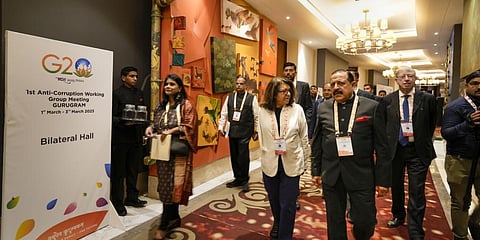G20 anti-corruption meet: India pushes for faster extradition of fugitive economic offenders
GURUGRAM: India on Wednesday emphasised on multilateral action rather than bilateral coordination to ensure faster extradition of fugitive economic offenders and recovery of stolen assets from abroad during the anti-corruption working group meeting of G20 nations here.
In the inaugural session, Union Minister of State for Personnel Jitendra Singh said the corrupt find a way to park their proceeds of crime and "it is such money that is pushed into evil activities."
"This is one of the major sources of terror funding. From illegal drugs that destroy young lives to human trafficking, from weakening democracies to sale of illegal arms, this dirty money funds many destructive enterprises," he said.
Singh said there is a need for the global community to work even faster for the recovery of assets through the proactive sharing of information between the G20 countries.
"Therefore, for better coordination, streamlining of judicial processes and timely disposal of cases, there is a requirement for multilateral action rather than bilateral coordination, which proves to be more complex and presents obstacles in making progress on cases related to fugitive economic offenders (FEOs) and recovery of related assets," the minister said.
He said there have been numerous instances of financial or banking frauds that were investigated under relevant statutory provisions that involved high net worth individuals where the proceeds of crime involved was more than USD one billion.
During the course of the investigation, it was found that the offenders fled the country before or after detection of the offence and as a result, their passports were revoked with a view to restricting their movement, the minister said.
"The Enforcement Directorate has transferred assets worth about USD 180 billion to public sector banks that suffered losses to the tune of around USD 272 billion due to frauds committed allegedly by high-net-worth individuals," Singh said.
Even after initiating the process of getting information from foreign countries on assets through Letters Rogatory (LR), the process of extradition was found to be highly complex and time-consuming that led to delay in investigation and trial of offences, he said.
"It is our considered view that strengthening of mechanisms for speedy confiscation of the proceeds of crime, both at home and abroad, will force the offenders to return to their home country," the MoS said.
This will allow for an effective investigation and speedy trial for the related offence, he added.
"This would also help the banks and other financial institutions and tax authorities to achieve recovery from defaults committed by such FEOs, thus restoring, to some extent the overall health of these banks and other financial institutions, while eliminating the possibility of further misuse of these funds," Singh said.
He said corruption is a complex social, political and economic challenge affecting all countries.
"In a globalised world, corruption has ramifications well beyond the G20. It adversely impacts the effective utilisation of resources, creates market distortions, adversely impacts the quality of life of citizens, impacting the benefits of globalisation and consequently, economic growth and overall governance and most disproportionately affecting the poor and most marginalised," Singh said.
Economic offences have been a problem faced by many, especially when the offenders flee from the jurisdiction of the country, he said.
India has put in place specialised legislation in this regard in the form of the Fugitive Economic Offenders Act, 2018, the term wherein 'fugitive economic offender' or FEO is defined as an individual against whom a warrant of arrest in relation to scheduled offence has been issued by any court in India and who has left the country so as to avoid criminal prosecution; or the FEO abroad, refuses to return to face criminal prosecution, Singh said.
He said Prime Minister Narendra Modi has envisioned developing such an administrative ecosystem for a developed India, which has zero tolerance for corruption.
"Taking inspiration from him, India's presidency will aim to focus on pragmatic action-oriented steps in addressing the wider implications of corruption to strengthen international cooperation on anti-corruption matters and deepen the G20 commitment towards countering the corrupt actors and corruption," he said.
As the primary forum for global economic cooperation, the G20 has to take responsibility to lead global efforts towards battling the menace of corruption, the minister said.
Since its inception in 2010, the G20 anti-corruption working group (ACWG) has been at the forefront of addressing all forms of corruption, he said.
"The Indian G20 Presidency will build on the robust foundation laid in the G20 ACWG during the previous presidencies and further strengthen the G20 nations' commitment to ensuring zero tolerance against corruption," the minister said.
He said Modi has stated at numerous occasions that "a safe and secure world is our shared responsibility."
"It is important that all the state parties reflect the same determination against corruption," the minister said and added that the working group under the co-chair ship of Italy "will come up with substantial outcomes aimed at preventing and combatting corruption."

